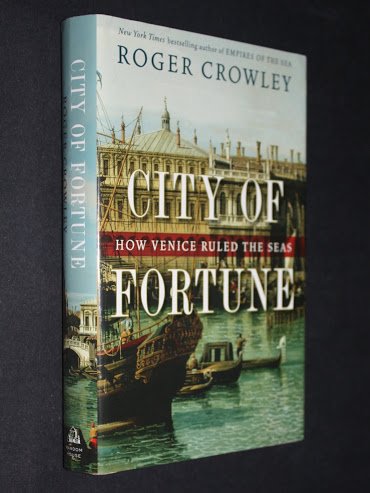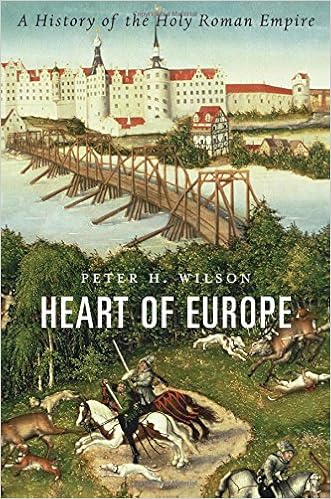. . . . Our Current Reading Cluster . . . .
Time for reading has been severely truncated these last months due to so much travel and other things that involve often staying up late and most certainly not reading, not even our bedtime reading. But we are crawling along progressively, nevertheless. Our, particularly my, interest in the subjects have grown quite naturally out of the last two years' reading of the Roman Empire, the Dark Ages, Vikings, Mongolians, the Merovingians and Carolinians.
Two of the books we are currently reading are by medieval - Renaissance era scholar of Mediterranean History, Robert Crowley. I first learned of him two winters ago via his splendid history of the fall of Constantinople to Ottoman emperor, Mehmet II, 1453: The Holy War for Constantinople and the Clash of Islam and the West (2005).
These two books continue the delving into the conflicts of the Ottoman Empire vs. the Roman Church, the various kingdoms and principalities of Europe and the Holy Roman Empire.
El V was able to finish Empires of the Sea: The Siege of Malta, the Battle of Lepanto, and the Contest for the Center of the World (2008) over an IV schedule of antibiotics. For the first course I'd brought two books with me, suspecting that he would finish the book he had before being able to go home. O lordessa, the Europeans are such dickheads, always screaming O NOES! the Muslims are going to get us! They even say so! They're taking away our trade! -- which they seem not to have comprehended was the consequence of them giving no help to Constantine XI Palaiologos, no matter how much he personally begged and degraded himself through Europe and the Vatican. So, of course, now in the 16th century, after losing Constantinople, as guardian and buffer of trade routes and destination, the Europeans all cry the same things, and just as the , don't do any frackin' thing to help out. The carnage is unbelievably savage on both sides -- and the bravery and stamina of the knights and other defenders of Rhodes, Cyprus and Malta fighting to hold their islands, incalculable.
Aftre months of siege, unlike as at Rhode and Cyprus, Malta drove off the Turkish navy and army. It barely happened though, and wouldn't have, without the absolutely timely sudden infusion of help out of Sicily, led by basically independent out of Spain and Italy -- nothing official from any king or the Church. But if the original defending forces hadn't been so brilliant, if they hadn't held on so long that Suleiman the Magnificent's forces were already losing heart, it wouldn't have mattered, as outnumber and non-supplied as they were.
Did the Europeans learn anything from this? Of course not, no more than they did from the fall of Constantinople in 1453, and no more than the US ever learns anything about the middle east from one lurch into disaster to another.
I still have the even more bloody Battle of Lepanto to go.
The second Crowley book further digs into the utter failures of the West to deal with the threats from Islam, City of Fortune: How Venice Ruled the Seas (2011). This one begins with the catastrophe that is known in western history as the Fourth Crusade of 1203 - 04, the one in which the Europeans sacked several Christian cities, including Constantinople, instead of fighting 'Sarcens.' These cities should have been the Crusade's allies, but were trade rivals to the trade empire of Venice and others such as Genoa. Yes, Venice was another empire of these centuries, that played on the board with the Holy Roman Empire, the Byzantine Empire, the Angevin Empire, the various "Saracen" empires, and very soon now, the Mongol Empire. A business contracts, especially one made with Venice, always trumps everything. You European noblemen have fewer volunteers than you thought? You don't have as much funding as you told us you did? You still owe us. Destroy these rival cities for us and maybe we'll call it even. Honestly, I can't wait for Mehmet II to take Constantinople and leave Venice and the Western Mediterranean forces high and dry, now that they can't get to the trade routes of the Black Sea and Central Asia. They earned it. (O well, they have all the riches and resources of the continents across the Atlantic to plunder and keep them rich -- not to mention Africa.) We're reading this one together before bed.
I am reading four books on my own, not doing the cross-reading and discussion with el V as we have done with the Crowley books. These are all meaty and are taking a very long time. I go back-and-forth among them
The first one is Peter H. Wilson's Heart of Europe: A History of the Holy Roman Empire (2016). In some ways this is a key book because it covers all the ground of all the books in this reading cluster. Despite what Voltaire quipped, the Holy Roman Empire was an empire, and it was very much formed by Rome, and though maybe not exactly holy, it's whole history was entwined with the Roman Church. And it survived in one form or another until the last vestiges were erased by WWI -- maybe. I say maybe, because so many of the family names and titles that ruled one part and another of the empire over its many centuries, still survive, and many of those with those names and titles are still rich and still hold a great deal of land in Europe, from the Iberian peninsula on the edge of Europe east into Savoy, Germany, Poland, Hungary and the Balkans.
The endurance of the western Roman Empire dream is as incalculable as the courage of the defenders of Rhodes first, and Malta next, in the 16th century. Among small facts gleaned that help illuminate history is the process by which kings in Europe were created.
No king can create another king. A king must be created - recognized by another greater power, which, in Europe's case would have been the Pope, i.e. heaven, or an emperor -- thus Holy Roman Emperor - Empire. In Europe's case, both Pope and Empire declare direct descent from the Roman Empire -- and thus we can see how inextricably the Church and the Empire were fused. Which created endless political - military conflicts over who has the ultimate power and who owns what.
This information makes it even easier to understand Napoleon's drive to marry a daughter of either Russia's or Austria's imperial family. He had crowned himself emperor, but his own heirs would not be recognized after his death as imperial unless the mother was. Josephine did not fit this criterian -- and, of course, she could no longer produce an heir at all, it was claimed, since a balcony on which was standing collapsed and the fall injured her lower body seriously.
Empires, all these empires, and all their emperors claimed to be the western Roman empire's Caesar -- and that includes the Ottomans. How furious was Süleyman for instance, who had declared himself Caesar, ruler of all Rome, when Charles V was crowned Holy Roman Emperor by the Pope.
The Holy Empire continued, even when there was no crowned emperor which was the case often, for many reasons, particularly if the figure who might have been elected emperor by the Empire's electors was in a death struggle with the Pope for control of Italy and everything else.
Caroline Finkel's Osman's Dream: The History of the Ottoman Empire (2005) is exactly what it says. Osman's own father is the legendary Ertugruel, he of my beloved Turkish television historical series, Resurrection: Ertugrul. I so love this series that I have been sitting on the last 15 episodes since sometime this winter, incapable of finishing watching because -- there are no more! and then what shall I do? At least I've finally learned the name of Ertugrul's intelligent horse -- Altolgali.
The third book I'm reading is the almost excessively detailed of the 1683 Ottoman siege of Vienna (by no means their first attempt to take Vienna), The Enemy at the Gate: Habsburgs, Ottomans and the Battle for Europe (2008) by the Andrew Wheatcroft.
The final work is Princeton professor Anders Winroth's The Age of the Vikings (2014). This is filled with illuminating information, such as the Norsemen didn't use sails until the 10th century. But the book I really want, and still haven't found, is the one that provides a detailed history of the Norse in France up into the Angevin Empire.
The scholars / professors who have provided these wonderful books read all the languages, which include of course latin and greek, Turkish and the Venetian dialect, French, Spanish and German -- particularly Old French and Old German, and, as with Winroth, runes and various Norse languages, so all of these depend almost entirely on the primary documents, which is another reason these books are invaluable reading. The ability to read the Venetian dialect is particularly necessary since the Venetian ambassadors were often eye-witness historians of the events such as at Constantinople in the fall of 1453.
These books will convince anyone that the most stupid move of Europe during all these centuries was one of omission. They refused to shore up the Greek / Byzantine empire, which was the greatest buffer between them and the constant pressure of threats out of the east and Central Asia. But they wanted it all and could only see Constantinople as eating their profits. Once the Ottomans held the Dardanelles, the Bosphorus and the Mamara Sea, they owned the Black Sea, and all the infinitely ancient the routes north, east and south. So of course they were going to claim the White Sea too (the western Mediterranean). Then came the endless decades of endless piracy for booty and particularly slaves. Those galleys whether Ottoman or Venetian or just plain out and out pirates depended on galley slave rowers and their life expectancy was even shorter than that of the sugar slaves in the New World.
Gads, most human beings are cruel and stupid.
Subscribe to:
Post Comments (Atom)








No comments:
Post a Comment